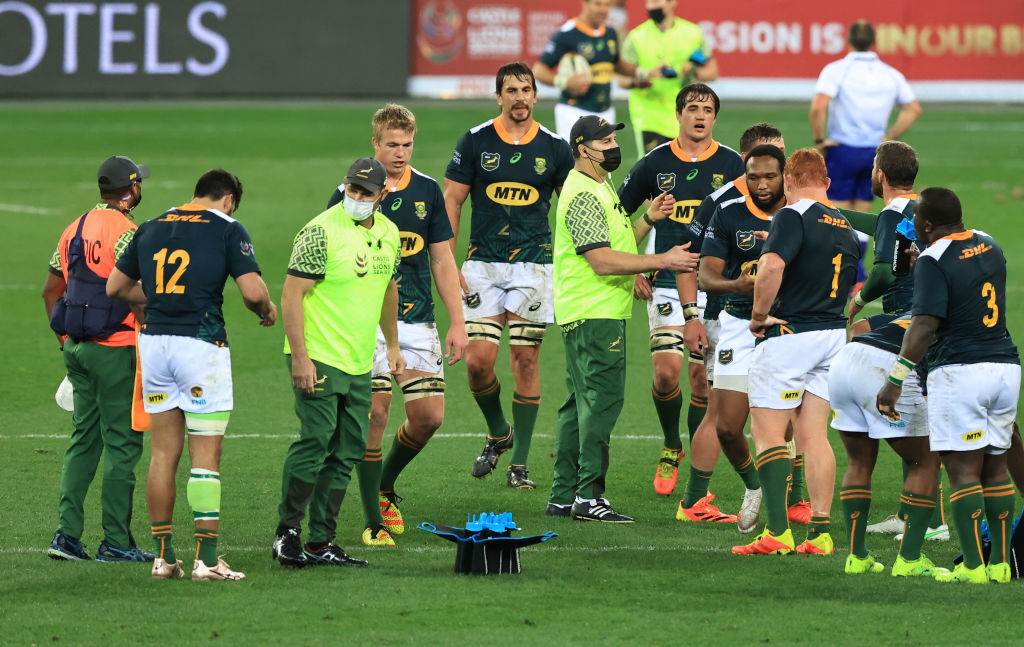Let’s pour cold water over this Rassie Erasmus ruse | Nick Cain

CAPE TOWN, SOUTH AFRICA - JULY 14: South Africa coach Rassie Erasmus (c) wearing a face covering acts as a water boy during the match between South Africa A and the British and Irish Lions at Cape Town Stadium on July 14, 2021 in Cape Town, South Africa. (Photo by David Rogers/Getty Images)
THE Rassie Erasmus decision to become a waterboy-coach during the midweek clash between the Lions and South Africa A sparked an argument which has been waiting in the wings for years.
Erasmus, who is now South Africa's director of rugby, took over the coaching of the A team when Jacques Nienaber – who succeeded him as Springbok coach after the 2019 World Cup triumph – was forced into Covid self-isolation.
Erasmus has always had a reputation as a left-field tactical thinker, with the 6-2 ‘bomb-squad' bench split during the last World Cup a case in point. This time he was not so much left-field as perpetually on the field as he donned tracksuit, yellow bib, and a mic and earphones during the match at the Greenpoint Stadium to deliver a torrent of tactical instructions to his players.
However, as Erasmus appropriated the Adam Sandler role from the Hollywood film, The Waterboy, there were a couple of significant alterations to the script. First, no prankster hijacked his hose and sprayed him with good old H2O, and second…he was not carrying any water.
This oversight was raised by Warren Gatland as the Lions head coach commented on his South African rival's new role. “It's a little bit interesting – you won't see me doing that. Different strokes for different folks, I suppose, but it's a little bit strange the director of rugby of South Africa being also a waterboy.”
Gatland proved in New Zealand on the 2017 Lions tour that he is pretty adept at verbal sparring, and with Erasmus not shy when it comes to psychological one-upmanship, the tension heading into next weekend's First Test was tangible.
Erasmus, whose Springbok bubble had been pierced by six players, including captain Siya Kolisi, testing positive for Covid, was so desperate to get more competitive match-action against the Lions that he tried to goad Gatland into playing the South Africa A team again yesterday, instead of the Stormers.
He did it by suggesting the Lions were “scared” to pick up the gauntlet he had thrown down. Gatland responded: “I think he's trying to wind us up saying we're scared – sometimes he's capable of doing that.”
He then entered into a waterboy war by poking fun at Erasmus. Gatland said: “I didn't understand what his role was. You don't run onto the pitch giving messages and stuff if you are the waterboy, without carrying the water! My advice is to make sure he is carrying water the next time he does that.”
While there is a comical element to this, the underlying issues regarding coaching on the field during matches requires serious scrutiny. This game is for players as well as coaches, and what has to be addressed is whether the pendulum has swung too far towards coaches being much too interventionist, to the extent that they are undermining the tactical development of players.
“Waterboys should be on the sidelines with H2O rather than tactical instructions”
Rugby Union is primarily a players' game, which means that as well as honing skills and physical conditioning, they are developing tactical know-how. Pitting your wits tactically against the opposition is an intrinsic element of the contest, and is what gives the game such a rich and rewarding weave.
Rugby Union is a game of strategy as much as it is of skill and physical prowess. Yet, by allowing coaches like Erasmus – and many others – to dominate the tactical input by standing on the pitch as water-carriers and dictating strategy and positional play, rather than handing that responsibility to players, the game is losing too much of its spontaneity and unpredictability.
In many ways coaches are inhibiting players with their spoon-feeding, and stopping the instinct to think for themselves, which has already been clipped by dawn-to-dusk academy regimes.
There is also the danger of some teams exploiting loopholes. For instance, during the 2019 World Cup final, Nienaber, who at the time was Springbok defence coach, as well as being a qualified physio, was not only coaching on the touchline, but also allowed onto the pitch with tactical advice.
It meant that when England set siege on the South African try line in the first-half, Nienaber was able to shout defensive instructions from the sidelines. It does not take much imagination to picture the potential for a touchline bust-up if the England attack coach was a few metres from him doing the same thing at the same time.
The touchline flashpoint between Steve Borthwick and Pat Lam over the replacement shenanigans in Leicester's recent Premiership game against Bristol is an unwelcome warning sign of how off-field altercations between coaches can spike the action on the field.
While two blokes in tracksuits arguing with each other might initially have a bit of novelty value, it will not take long before it becomes tedious intrusion.
Put coaches back in the stands, leave the verbal sparring to Press conferences, leave the field as a stage for the players – and let's have waterboys on the sidelines with H2O rather than tactical instructions.